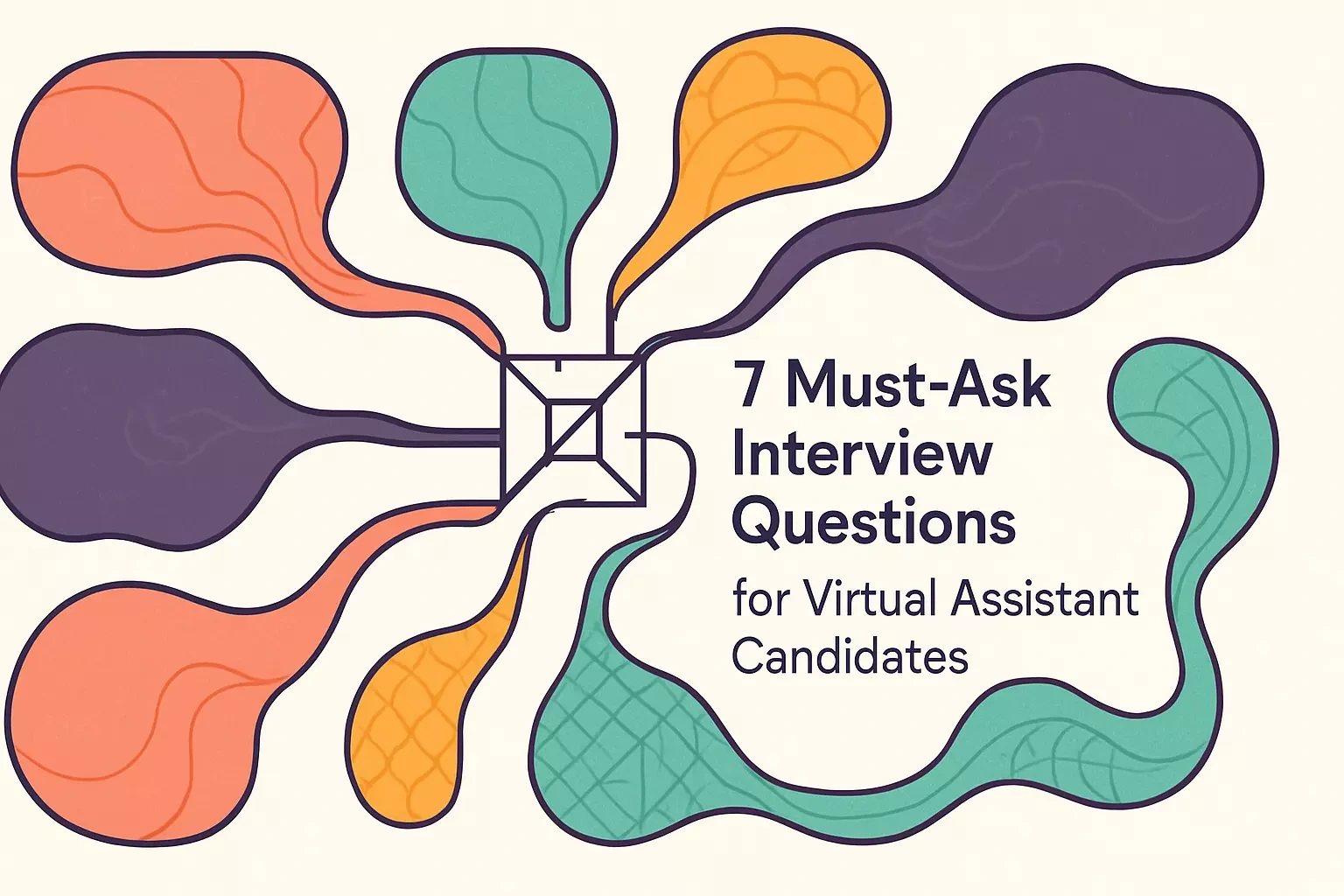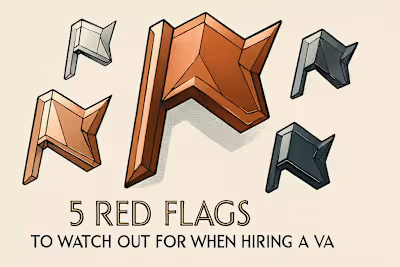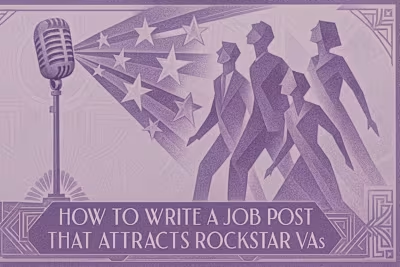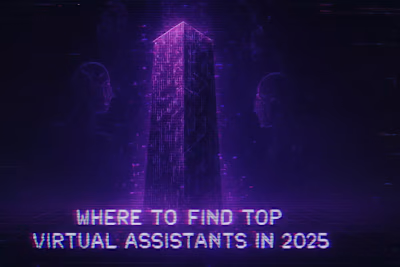7 Must-Ask Interview Questions for Virtual Assistant Candidates

7 Must-Ask Interview Questions for Virtual Assistant Candidates
Question 1: Experience and Background
What to Look For
Question 2: Time Management and Organization
What to Look For
Question 3: Problem-Solving Abilities
What to Look For
Question 4: Communication and Collaboration
What to Look For
Question 5: Tech and Tool Proficiency
What to Look For
Question 6: Handling Feedback and Conflict
What to Look For
Question 7: Availability and Work Style
What to Look For
Making Your Final Decision
References
7 Must-Ask Interview Questions for Virtual Assistant Candidates
Finding the perfect virtual assistant feels a bit like dating. You need someone who gets you, shares your work style, and won't ghost you when things get busy. Asking the right interview questions is the key to finding a virtual assistant who not only has the right skills but also aligns with your company culture.
A great job post gets them in the door, but a thoughtful interview process ensures you hire the right person. Think of it this way: your job post is the invitation to the party, but the interview is where you really get to know each other. After the interview, it's equally important to know the red flags to watch out for to avoid costly hiring mistakes.
The virtual assistant role has evolved dramatically. Today's VAs are strategic partners who can manage complex projects, handle customer relationships, and even contribute to business growth. That's why hiring a VA requires more than just checking off a skills list. You need to dig deeper.
Let's dive into the seven essential questions that will help you identify top-tier virtual assistant candidates. These aren't your typical "tell me about yourself" questions. They're designed to reveal real insights about how candidates work, think, and solve problems.
Question 1: Experience and Background
"Can you walk me through your experience as a virtual assistant and tell me about the clients or industries you've served?"
This opener sets the tone for the entire interview. It's broad enough to let candidates showcase their strengths while specific enough to gather valuable information. Pay attention to how they structure their response. Do they ramble, or do they present a clear narrative?
The best candidates will paint a picture of their professional journey. They might say something like: "I started as a general VA for a small marketing agency, handling email management and scheduling. Over two years, I expanded into social media management and client onboarding. Last year, I specialized in supporting SaaS startups, where I managed customer success workflows and helped implement new project management systems."
What to Look For
Look for specific examples of tasks they've handled, tools they've used, and measurable achievements. A candidate who says "I helped improve client communication" is less impressive than one who shares "I implemented a weekly update system that reduced client check-in emails by 40%."
Their answer should give you insight into their career progression and areas of expertise. Have they grown their skills over time? Do they seek out new challenges? Strong candidates often mention certifications they've earned or new skills they've developed to better serve their clients.
Watch for candidates who can articulate the why behind their career moves. Maybe they transitioned from general admin to e-commerce support because they discovered a passion for online business. This shows intentionality and self-awareness.
Question 2: Time Management and Organization
"How do you prioritize tasks and manage your time when working with multiple clients or deadlines?"
Time management separates good VAs from great ones. This question reveals whether they have systems in place or if they're winging it. You want someone who can juggle multiple priorities without dropping balls.
Listen for concrete strategies. A strong answer might include: "I use time-blocking to dedicate focused hours to each client. Urgent tasks get flagged in my project management system, and I review priorities every morning. I also build buffer time into my schedule for unexpected requests."
What to Look For
A strong candidate will describe their system for organization, whether it's using tools like Asana, Trello, or a detailed calendar system. They should mention specific features they use, like color-coding, priority labels, or automated reminders.
This question assesses their ability to handle workloads efficiently and meet deadlines. Red flags include vague answers like "I just stay organized" or signs they might overcommit. The best candidates understand their capacity and communicate boundaries clearly.
Look for evidence of proactive communication. Do they mention updating clients on progress? How do they handle competing deadlines? A great VA will explain how they negotiate timelines when conflicts arise.
Question 3: Problem-Solving Abilities
"Describe a challenging situation you faced in a previous role and how you resolved it. What was the outcome?"
This behavioral question cuts through rehearsed answers to reveal how candidates actually perform under pressure. You're not looking for perfection – you're looking for resourcefulness and learning ability.
A compelling answer follows the STAR method: Situation, Task, Action, Result. For example: "A client's email system crashed the day before a major product launch. I immediately researched alternatives, set up a temporary solution using a different platform, and created a quick guide for the team. We didn't miss a single customer inquiry, and the client later adopted my backup system permanently."
What to Look For
This behavioral question evaluates their problem-solving skills, initiative, and ability to stay calm under pressure. Listen for a logical thought process and a focus on finding a solution rather than assigning blame.
The best answers show ownership and creativity. Did they wait for instructions, or did they take initiative? How did they communicate during the crisis? Look for candidates who mention learning from the experience or implementing preventive measures.
Pay attention to the scope of problems they've handled. A VA who's navigated complex technical issues or difficult client relationships demonstrates higher-level thinking than one who only mentions minor scheduling conflicts.
Question 4: Communication and Collaboration
"What's your preferred method of communication for daily updates, urgent matters, and general questions? How do you ensure clear communication while working remotely?"
Communication makes or breaks remote working relationships. This question reveals whether a candidate understands the nuances of virtual collaboration. Their answer should show flexibility and awareness of different communication needs.
Strong candidates might respond: "I adapt to each client's preferences, but I typically suggest daily check-ins via Slack, weekly video calls for deeper discussions, and email for formal updates. For urgent matters, I establish a clear escalation path – maybe a specific Slack channel or phone calls for true emergencies."
What to Look For
Effective communication is critical for remote work. Look for a candidate who emphasizes regular updates, clarity, and is comfortable with tools like Slack, email, and video calls. They should understand that over-communication often beats under-communication in remote settings.
This also helps assess their ability to work with team members in different time zones. Do they mention strategies for asynchronous communication? How do they handle delays in responses? The best candidates have thought deeply about these challenges.
Watch for signs of professional boundaries too. A candidate who's available 24/7 might burn out quickly. Look for someone who balances responsiveness with sustainable work practices.
Question 5: Tech and Tool Proficiency
"What software, tools, and platforms are you proficient in? Are there any you're eager to learn?"
Technical skills can be taught, but tech-savviness is harder to develop. This question reveals both current capabilities and learning potential. You're looking for someone who embraces technology rather than fears it.
Great answers go beyond listing tools. They might say: "I'm advanced in Google Workspace and have automated many processes using Zapier. I recently taught myself basic Canva design to help clients with social media. I'm eager to learn more about AI tools for content creation – I've been experimenting with ChatGPT for first drafts."
What to Look For
Ensure their technical skills align with your needs, whether it's Google Workspace, a specific CRM, or project management software. But don't just check boxes. Ask follow-up questions about how they've used these tools to solve problems.
Their willingness to learn new tools is also a great indicator of adaptability. Technology changes rapidly, and you need someone who evolves with it. Look for candidates who mention self-directed learning, online courses, or experimentation with new platforms.
Consider their troubleshooting abilities too. Can they figure things out independently, or do they need constant tech support? The best VAs are resourceful problem-solvers who Google before they panic.
Question 6: Handling Feedback and Conflict
"How do you handle constructive feedback or a situation where a client was unhappy with your work?"
Nobody's perfect, and this question reveals emotional intelligence and professional maturity. You want someone who can take feedback gracefully and turn mistakes into growth opportunities.
A mature response might sound like: "I once misunderstood a client's brand voice and wrote social media posts that were too casual. When they expressed concern, I asked for specific examples of their preferred tone, created a style guide for future reference, and revised all the content. The client appreciated my proactive response, and we've worked together for two years since."
What to Look For
This question assesses their professionalism, coachability, and client relationship management skills. A good answer will show they are receptive to feedback and focused on improvement rather than being defensive.
Look for candidates who view feedback as data, not criticism. Do they ask clarifying questions? Do they implement changes quickly? The best VAs see feedback as a tool for delivering better results.
Watch out for blame-shifting or excessive self-deprecation. You want someone confident enough to accept responsibility but not so insecure that they crumble under criticism. Balance is key.
Question 7: Availability and Work Style
"What are your typical working hours and what is your availability? How do you maintain a work-life balance while working remotely?"
This practical question prevents future conflicts and reveals self-management skills. You need someone whose schedule aligns with your needs but who also maintains healthy boundaries.
A thoughtful answer addresses both logistics and philosophy: "I typically work 9-5 EST, but I'm flexible for occasional urgent needs. I check messages once in the evening for anything critical. To maintain balance, I have a dedicated workspace, take regular breaks, and completely disconnect on weekends unless we've arranged otherwise. This helps me stay energized and productive long-term."
What to Look For
This question clarifies practicalities like time zone alignment and availability for urgent tasks. But it also provides insight into their ability to set boundaries and manage their own productivity, which is key for long-term success in a remote role.
Beware of candidates who seem available 24/7 or those with overly rigid schedules. The sweet spot is someone who's reliable and flexible but also protects their personal time. Burnout is real in remote work, and you want someone who manages their energy wisely.
Look for signs of a structured routine. Do they have strategies for staying focused at home? How do they handle distractions? The best remote workers are intentional about their environment and habits.
Making Your Final Decision
After asking these seven questions, you'll have a comprehensive picture of each candidate. But remember, interviews are two-way streets. The best VAs will also be evaluating whether you're the right fit for them.
Take notes during each interview and compare responses across candidates. Look for patterns in their answers. Does their communication style match your needs? Do their examples demonstrate the level of expertise you require?
Consider doing a paid trial project before making a final decision. This gives both parties a chance to test the working relationship without long-term commitment. A week-long trial can reveal more than any interview question.
Trust your instincts too. Sometimes a candidate looks perfect on paper but something feels off. Or maybe someone with less experience shows exceptional potential and enthusiasm. The best hiring decisions balance logic with intuition.
Remember, hiring a virtual assistant is an investment in your business growth. Take time to find someone who not only handles tasks but also contributes ideas and grows with your company. The right VA becomes an invaluable partner in your success.
These seven questions are your roadmap to finding that perfect match. Use them wisely, listen carefully, and you'll build a remote team that takes your business to new heights.
References
Like this project
Posted Jun 30, 2025
Hiring a VA? These 7 interview questions will help you assess skills, reliability, and fit. Find the perfect virtual assistant for your team with our expert guide.










